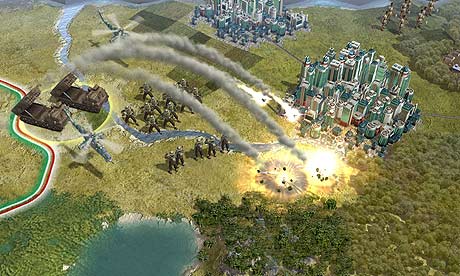If you happen to have touched a computer some time within the last 20 years, the chances are you may well have spent a regrettably long time playing on one of the many instalments of Sid Meier's Civilization franchise. I doubt, however, that you will have devoted quite as much of your life to it as a contributor to the Reddit forums going by the name of Lycerius. He (it must be a he!) posted the following extraordinary statement:
"I've been playing the same game of Civ II for 10 years. Though long outdated, I grew fascinated with this particular game because by the time Civ III was released, I was already well into the distant future. I then thought that it might be interesting to see just how far into the future I could get and see what the ramifications would be."
Just in case you are one of the few people not to have played Civilization, and are therefore unaware of the planet-shifting magnetism of Lycerius' post, Here's a quick primer.
Civilization is a game that – true to its name – enables you to build your own civilisation. You start in 4000BC in a small village, which you gradually expand by farming, building things like libraries (so that you can develop technologies), and producing armies to conquer other territories. It's addictive, vaguely educational and most sane people stopped playing some time around 1997 (both in real and game years), once they'd built a spaceship and reached Alpha Centauri.
Not so Lycerius. He has carried on for an extra 2,000 years – although he is at pains to point out he doesn't just play Civilization II non-stop ("Naturally, I play other games and have a life..."). Yet, as quickly becomes apparent when you read through the rest of his post (as I urge you to do), even if Lycerius had dedicated all of his time to playing Civilization, it wouldn't have been wasted. The results are fascinating. He summarises them thus:
The world is a hellish nightmare of suffering and devastation.
There are three remaining super nations in the year AD3991, each competing for the scant resources left on the planet after dozens of nuclear wars have rendered vast swaths of the world uninhabitable wastelands.
The competition between Lycerius' civilisation (the Celts) and his two rivals, the Vikings and the Americans, has resulted in endless warfare:
"You've heard of the 100-year war? Try the 1,700-year war. The three remaining nations have been locked in an eternal death struggle for almost 2,000 years. Peace seems to be impossible. Every time a ceasefire is signed, the Vikings will surprise attack me or the Americans the very next turn, often with nuclear weapons."
Worse still, Lycerius explains:
"I wanted to stay a democracy, but the senate would always overrule me when I wanted to declare war before the Vikings did. This would delay my attack and render my turn and often my plans useless. And of course the Vikings would then break the ceasefire like clockwork the very next turn. Something I also miss in later Civ games is a little internal politics. Anyway, I was forced to do away with democracy roughly a thousand years ago because it was endangering my empire. But of course the people hate me now and, every few years since then, there are massive guerrilla (late game barbarians) uprisings in the heart of my empire that I have to deal with, which saps resources from the war effort."
Ouch.
By now, I'm guessing that you're either wondering why I'm telling you about all this (wonderful as it may be) on the books blog, or that you're finding the scenario outlined by Lycerius eerily familiar. Let me explain. As a commenter pointed out below the original post: "The parallels to 1984 are oddly chilling."
It seems that Lycerius has accidentally recreated the conditions prevalent in George Orwell's dystopia. Another commenter on the Reddit board writes:
"Parallels to 1984 off the top of my head: Three superpowers, a "communist" leadership in which technology has reached as far as it needs to go (end of technology tree), barbarian (resistance) uprisings constantly being stomped out by the totalitarian government, nuclear war rendering most farmland useless, constant breaking and reassembling of treaties between the three superpowers, seemingly infinite war (due to the previous point), an ever present and all knowing leader making the decisions of the nation..."
War is peace. The author of this incisive post concludes: "Sid Meier was one thorough sonofabitch."
The idea that the game is programmed to eventually turn out like 1984 is an intriguing one, although I prefer another possibility posited on the board: "Apparently George Orwell was a time traveller, and spent all his time in the future playing Civ II." Maybe he wasn't hiding away on a Scottish island after all.
There is something else troubling me, however. Maybe the Civ II game engine is neutral. Maybe it just tells it as it sees it. If humanity ever finds itself with scant resources, global warming and the ability to blow itself up many times over, the inevitable result will be an Orwellian nightmare. It's enough to make you want to turn your back on society, lock yourself in your room and do nothing but play computer games until civilisation inevitably collapses ...

Comments (…)
Sign in or create your Guardian account to join the discussion